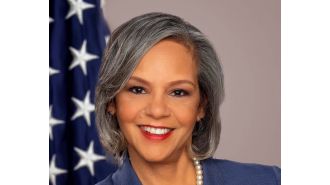Honduras defense official linked to drug trafficker and infamous mercenary company, raising questions about US drug war.
Col. Melgar Urbina linked to drug trafficker & security firm accused of killing activists. US Drug War ally exposed in The Intercept.

Col. Elias Melgar Urbina, a top-ranking Honduran military official and U.S. partner in joint drug war operations, has raised many questions. According to a U.S. Justice Department filing, he has been tied to a Honduran drug trafficker while a private security company accused of assassinating land rights activists has also been linked to him.
Melgar was appointed vice minister of defense by left-leaning President Xiomara Castro in 2022 and is the highest-ranking officer in the Honduran military. Last year, he met with U.S. Army Gen. Laura Richardson, the commander of U.S. Southern Command, to discuss “strengthening cooperation to support mutual security goals,” according to a press release from SOUTHCOM. U.S. training of Honduran soldiers, which had tapered off during the previous administration, has openly resumed under Castro.
In June, Melgar publicly announced his resignation after a riot at a women’s prison in Honduras left dozens of people dead. However, contrary to popular perception, he remains in his post. A human rights attaché for the Honduran military told The Intercept that Melgar is still vice minister of defense and a high-level government minister said he continues to appear at meetings.
During the trial of Geovanny Fuentes Ramírez in federal district court in Manhattan, U.S. prosecutors suggested the possibility that Melgar himself had links to the drug trade. Fuentes was convicted of conspiring with high-ranking Honduran politicians and military officials to traffic tons of cocaine into the United States. One of Fuentes’s “military contacts,” according to prosecutors, was Melgar.
A decade before becoming the de facto head of the Honduran military, Melgar was stationed as an intelligence officer in the Aguán Valley, a stretch of Caribbean coast home to industrial African palm plantations. The Aguán has been the site of protracted land disputes between farmer cooperatives and palm oil barons. According to multiple sources — including local farmers, journalists, and a lawyer who worked with land rights activists — Melgar participated in the operations of a notorious private security firm contracted by the largest palm corporation in the region.
When asked about the accusations, Melgar wrote in response to detailed questions from The Intercept, “It is not correct to write accusations of this type without the other side. It is illegal and unfair since clearing my name and that of my family is not and should not be my responsibility, but rather the media should be more responsible.” Melgar declined to elaborate, saying that he would only accept an in-person interview.
The U.S. has supported Honduran governments whose security forces have violently repressed protest, protected select figures in the drug trade, and executed perceived criminals with so-called extermination squads. From 2009 to 2020, Geovanny Fuentes Ramírez ran a high-level drug ring that trafficked South American cocaine through Honduras, relying on protection from Honduran military and police commanders. Court documents filed in the case against Fuentes indicate a possible connection between Melgar and the drug trafficker.
At Fuentes’s trial, federal prosecutors unveiled a list of contact information for various Honduran officials found on the defendant’s phone, which included a phone number under the name “Coronel Melgar Cmdte. Fusina,” or Col. Melgar, FUSINA commander. The prosecutors did not suggest that they had identified any specific communications between Melgar and Fuentes.
After Fuentes was convicted of drug trafficking and related firearms offenses, prosecutors filed a memo asking the court to impose a life sentence. In the August 2021 sentencing submission, they argued that Fuentes’s operation thrived thanks to his “corrupt contacts in the military and police.” The memo read that one of the defendant’s military contacts was Colonel Melgar. Ponce Fonseca and Flores, who were also named in the memo, could not be reached for comment.
Cristián Sánchez, head of the Pro-Honduras Network, said, “The armed forces have been the key for turning Honduras into a narco-state.” Sánchez attended Fuentes’s trial and called attention to the court references to Melgar earlier this year.
The U.S. has continued to collaborate with the Honduran military. In October, two U.S. National Guard brigades deployed to Honduras to train local troops. Honduran forces participated in a training course in Guatemala organized by U.S. Southern Command and in July, Honduras hosted a training course for the First Special Forces Battalion carried out by members of the U.S. Army’s 7th Special Forces Group.
Land conflicts in the Aguán Valley date back to the 1990s, when palm oil corporations began wresting control of farms from the region’s smallholders in order to plant the lucrative commodity. The corporations and the government engaged in coercive purchases, according to peasant farmers, or campesinos, who formed co-ops, occupied land, and fought in the courts to reclaim their titles. Their resistance was met with violence. Gerardo Argueta, a member of the Francisco Cano cooperative who fled the Aguán and sought asylum in the U.S., told The Intercept, “I’ve always expressed my fear of returning to Honduras because of Melgar. Imagine, now he’s vice minister of defense. ... He could order anything now with all that power.”
Col. Elias Melgar Urbina, a top-ranking Honduran military official and U.S. partner in joint drug war operations, has been linked to a Honduran drug trafficker and a private security company accused of assassinating land rights activists. Melgar was appointed vice minister of defense by President Xiomara Castro in 2022 and is the highest-ranking officer in the Honduran military.
Last year, Melgar met with U.S. Army Gen. Laura Richardson to discuss “strengthening cooperation to support mutual security goals” according to a SOUTHCOM press release. This was part of the U.S. training of Honduran soldiers which had tapered off but has resumed under Castro.
In June, Melgar publicly announced his resignation after a riot at a women’s prison in Honduras left dozens of people dead, but contrary to popular opinion he remains in his post. A human rights attaché for the Honduran military told The Intercept that Melgar is still vice minister of defense, and a high-level government minister said he continues to appear at meetings.
During the trial of Geovanny Fuentes Ramírez in federal district court in Manhattan, U.S. prosecutors suggested the possibility that Melgar himself had links to the drug trade. Fuentes was convicted in March 2021 of conspiring with Honduran politicians and military officials to traffic tons of cocaine into the United States. One of Fuentes’s “military contacts”, according to prosecutors, was Melgar.
Meanwhile, a decade before becoming the de facto head of the Honduran military, Melgar was stationed as an intelligence officer in the Aguán Valley. This region is home to industrial African palm plantations and has been the site of protracted land disputes between farmer cooperatives and palm oil barons. Local farmers, journalists, and a lawyer who worked with land rights activists accused Melgar of participating in the operations of a notorious private security firm contracted by the largest palm corporation in the region. This private security firm was accused of waging a campaign of terror to chase farmers off plantation land, including targeted killings.
“It is not correct to write accusations of this type without the other side,” Melgar wrote in response to detailed questions from The Intercept. He repeatedly declined to elaborate, saying that he would only accept an in-person interview.
For decades, the U.S. has supported Honduran governments whose security forces have violently repressed protest, protected select figures in the drug trade, and executed perceived criminals with so-called extermination squads. Since 2009, when a military coup greenlit by the State Department ousted former President Manuel Zelaya, the U.S. has supported sweeping security initiatives to militarize Honduran forces.
Geovanny Fuentes Ramírez ran a high-level drug ring that trafficked South American cocaine through Honduras with protection from Honduran military and police commanders, as well as former President Juan Orlando Hernández. Court documents filed in the case against Fuentes indicate a possible connection between Melgar and the drug trafficker. At Fuentes’s trial, federal prosecutors unveiled a list of contact information for various Honduran officials found on the defendant’s phone, which included a phone number under the name “Coronel Melgar Cmdte. Fusina,” or Col. Melgar, FUSINA commander.
After Fuentes was convicted, prosecutors filed a memo asking the court to impose a life sentence. In the August 2021 sentencing submission, they argued that Fuentes’s operation thrived thanks to his “corrupt contacts in the military and police” which included Colonel Leandro Flores, head of an anti-gang unit, and Colonel Melgar, a commander in an anti-narcotics multi-agency task force.
The appearance of Melgar’s name in the trial record was largely overlooked by journalists, but Cristián Sánchez, head of the Pro-Honduras Network, called attention to the court references to Melgar earlier this year. “The armed forces have been the key for turning Honduras into a narco-state”, Sánchez told The Intercept.
U.S. officials have continued to collaborate with the Honduran military. In October, two U.S. National Guard brigades deployed to Honduras to train local troops, and in July, Honduras hosted a training course for the First Special Forces Battalion carried out by members of the U.S. Army’s 7th Special Forces Group.
Violence surrounding land conflicts in the Aguán Valley has been ongoing since the 1990s. Palm oil corporations began wresting control of farms from the region’s smallholders in order to plant the lucrative commodity, and after peasant farmers formed co-ops, occupied land, and fought in the courts to reclaim their titles, they were met with violence.
It appears Col. Elias Melgar Urbina may have been involved in some of this violence while stationed as an intelligence officer in the Aguán Valley. While questions remain about his possible involvement, it is clear that Melgar has a troubling history that has never been fully reported.






